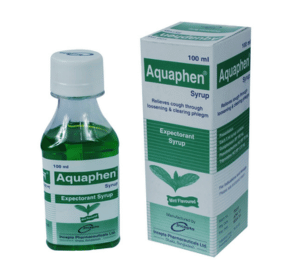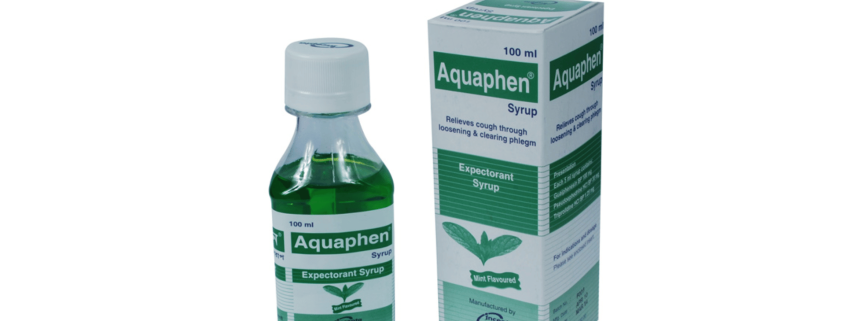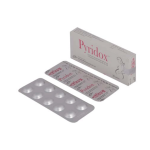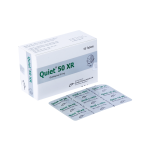Aquaphen(Pseudoephedrine, guaiphenasine & triprolidine)

Therapeutic Group: Respiratory
Presentation
Aquaphen Syrup: Each 5 ml syrup contains Guaiphenesin BP 100 mg, Pseudoephedrine Hydrochloride BP 30 mg and Triprolidine Hydrochloride BP 1.25 mg.
Description
Aquaphen syrup is a mixture of expectorant, decongestant and antihistamine agent. Guaiphenesin has an expectorant action. It reduces sputum viscosity by increasing the volume and water content of the bronchial secretion thereby facilitating the expectoration of sputum. Pseudoephedrine has direct and indirect sympathomimetic activity and is an effective upper respiratory decongestant. Pseudoephedrine is substantially less potent than ephedrine in producing both tachycardia and elevation of systolic blood pressure and considerably less potent in causing stimulation of the central nervous system.Triporlidine provides symptomatic relief in conditions believed to depend wholly or partly upon the triggered release of histamine. It is a potent competitive histamine H1-receptor antagonist of the pyrrolidine class with mild central nervous system depressant properties which may cause drowsiness. Aquaphen syrup is absorbed from the gastrointestinal tract. Guaiphenesin is metabolized and excreted in the urine. Pseudoephedrine is largely excreted unchanged in the urine together with small amounts of its hepatic metabolite and triprolidine is metabolized in the liver and excreted usually as motabolites in the urine.
Indications
Aquaphen is indicated for the symptomatic relief of upper respiratory tract disorders accompanied by productive cough which benefit from the administration of a nasal decongestant, a histamine H1-receptor antagonist and an expectorant combination.
Dosage & Administration
Adult and Children over 12 years: 10 ml (2 teaspoonful) three times a day.
Children 6-12 years: 5 ml (1 teaspoonful) three times a day.
Children 2-5 years: 2.5 ml (1/2 teaspoonful) three times a day.
A physician’s advice is preferred before administering Aquaphen to children aged less than 2 years.
Side Effects
Central nervous system (CNS) depression or excitation may occur. Sleep disturbance and rarely hallucination have been reported. Skin rashes, tachycardia, dryness of mouth, nose and throat have occasionally been reported. Urinary retention has been reported occasionally in men receiving pseudoephedrine; prostatic enlargement could have been an important predisposing factor.
Precautions
Aquaphen may cause drowsiness and impair performance in tests of auditory vigilance. It may also impair the patients ability to drive and also to use machineries. So, driving and operation of machineries should be avoided during treatment with Aquaphen. Although there are no objective data, users of Aquaphen should avoid the concomitant use of alcohol or other centrally acting sedatives.
Although Pseudoephedrine has virtually no pressor effect in patients with normal blood pressure, Aquaphen should be used with caution in patients taking antihypertensive agents, tricyclic antidepressants or other sympathomimetic agents such as decongestant, appetite suppressants and amphetamine-like psychostimulants. The effects of a single dose of Aquaphen on the blood pressure of these patients should be observed before recommending repeated or unsupervised treatment.
As with other sympathomimetic agents, caution should be exercised in patients with hypertension, heart disease, diabetes, hyperthyroidism, elevated intraocular pressure and prostatic enlargement. Aquaphen should not be used for persistent or chronic cough such as occurs with smoking, asthma or emphysema or where cough is accompanied by excessive secretions unless directed by a physician.
Use in Pregnancy & Lactation
Pregnancy: Although pseudoephedrine, triprolidine and guaiphenesin have been in widespread use for many years without apparent ill consequence, there are no specific data on their use during pregnancy. So, caution should therefore be exercised by balancing the potential benefit of treatment of the mother against any possible hazards to the developing fetus.
Lactation: Guaiphenesin is excreted in breast milk in small amounts with no effect expected on infants. Pseudoephedrine and triprolidine are excreted in breast milk in small amounts but the effect of this on breast fed infants is not known. Caution should be exercised unless the potential benefit of treatment to the mother outweighs any possible risk of the infants.
Over Dose
The effects of acute toxicity from Aquaphen may include drowsiness, irritability, restlessness, lethargy, dizziness, gastrointestinal discomfort, respiratory depression, convulsion, tremor, tachycardia and hypertension. Incase of overdose, necessary measures should be taken to maintain and support respiration and control convulsion. Gastric lavage may be undertaken if indicated. Catheterization of bladder may be necessary.
Storage
Store below 25 °C. Protect from light. Do not refrigerate.
Commercial Pack
Aquaphen Syrup: Bottle containing 100 ml of syrup



